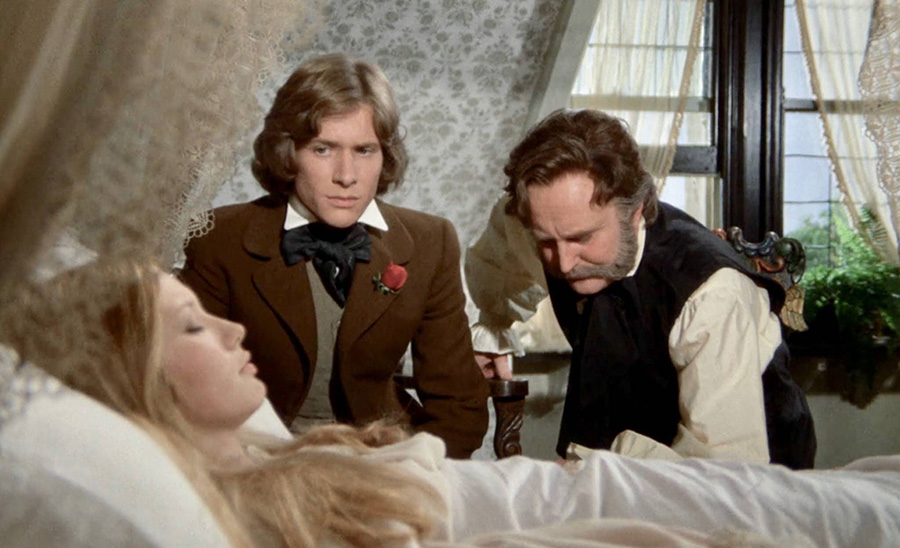DEMONS OF THE MIND
Directed by Peter Sykes. 1972. United Kingdom.

When we first meet Elizabeth, she is running through the woods. Who or what she is running from is unknown to us. She encounters Carl Richter, a medical student. They spend just a few days together, making love and enjoying the company, before Elizabeth is abducted and returned to her family estate in Bavaria. We meet her distraught father, the Baron Zorn, and her aunt Hilda. They return Elizabeth to her bedroom, locking the door. We also meet Elizabeth's brother, Emil, a gaunt and pale faced chap who also spends his days locked inside his bedroom. The Baron refuses to let them see each other and for good reason. Neither is well off mentally and the two siblings share an obvious incestuous attraction to one another.
A few days later, we find Richter in the company of Falkenberg, a hypnotist on his way to visit the Zorn family. He was the “doctor” treating Elizabeth in Vienna shortly before her escape into the woods. While Falkenberg heads off to the Zorn estate, Richter stays behind in town. The townsfolk are in a panic. Several women have recently gone missing in the woods surrounding the estate. Superstitious to the extreme, the townsfolk believe a demon is afoot, a suspicion spurred on by the recent arrival of a wandering, ranting Christian priest.
Meanwhile at the Zorn estate, we learn more about the inner workings of the family. The Baron's wife committed suicide many years ago, back when Elizabeth and Emil were only children, slashing her own throat in front of them. Hilda is using bloodletting to keep the siblings weak. Falkenberg tries to alleviate the madness in the family, a madness the Baron puts down to a hereditary stain, a severe madness passed down through the generations, a lunacy carried in the blood.
Equal parts Satanic Panic film and psychosexual thriller, DEMONS OF THE MIND is a film about madness. More precisely, about how madness begets madness. The Baron's tall tale of hereditary madness turns out to be true, only not quite in the way he believes it to be. The townspeople burn Pagan effigies for protection, a harmless bit of violent abstraction, only to be drawn into committing actual physical violence by the words of a lunatic priest. A trustworthy companion enables a character's madness by setting a brute upon helpless women, dutifully cleaning up the mess afterward. Instead of a man of science, we have a hypnotist acting as family doctor, promising cures and offering solutions not grounded in scientific reasoning, but in folk tales and delusion.
There are no heroes in this film. Even the most well-meaning of characters is informed by some line of faulty reasoning. The whole damn world of DEMONS OF THE MIND is insane. As such, it's a difficult film to get emotionally invested in, even after we learn the truth of what is going on, a revelation that turns a couple of characters we thought were simple nutty deviants into the films most tragic victims. What the film offers up in lieu of emotional resonance is visual splendor. DEMONS OF THE MIND is a gorgeous movie that aims for simple, naturalistic realism. It contrasts that realistic depiction of its setting and time period with the absolute madness of the narrative and its many instances of gruesome violence. This creates a film that feels itself unbalanced in vision and clarity, almost like the movie is slowly going mad right alongside the characters.
It's impeccably acted too, with strong lead performances from Robert Hardy and Patrick Magee, as well as wonderful supporting turns from Gillian Hills and Yvonne Mitchell. When you add in assured direction from Peter Sykes and gorgeous Arthur Grant photography, you have one hell of a film to be reckoned with. But alas, it under performed with both critics and audiences, and was largely dismissed as yet another example of just how far Hammer had fallen in 1972. It is certainly better appreciated these days and for good reason. It's a far more demanding film than most Hammer productions of that era and one that is largely free of any kind of tacky romanticism or tawdry melodrama. It contains all the requisite nudity and violence you would want from a Hammer production, and marries it to a tale that is measured but messy, psychologically complex but strangely reductive. It makes tonal consistency out of cacophony. DEMONS OF THE MIND is a film that by and large shouldn't work as well as it does, and it may take more than a single viewing to really figure out why it works at all. But make no mistake, there is glorious method in all its wonderful madness.